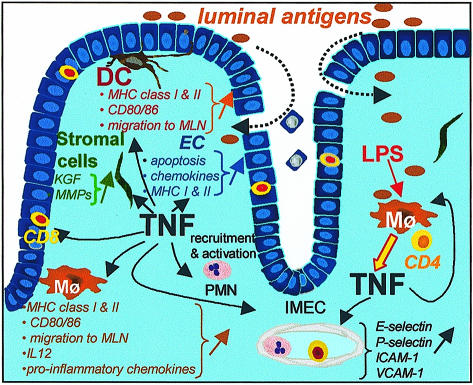Figure 2.
Possible disease-promoting effects of TNF in chronic intestinal inflammation. Colitogenic CD4 T cells may recognize luminal antigens on intestinal antigen-presenting cells and induce the enhanced synthesis of TNF in intestinal macrophages (Mφ) but possibly also in other cell types. TNF can directly affect the permeability of the intestinal epithelium by inducing an accelerated apoptosis of epithelial cells (EC), but may also initiate and perpetuate an inflammatory response through up-regulating adhesion molecules on intestinal microvascular endothelial cells (IMEC) and the enhanced expression of MHC class I and II antigens, but also of co-stimulatory molecules, on dendritic cells (DC) and Mφ (and possibly also on EC), TNF-induced production of matrix metalloproteases (MMPs) by stromal cells may lead to tissue remodelling and the enhanced TNF-mediated secretion of keratinocyte growth factor (KGF) may support a compensatory proliferation of the intestinal EC resulting in an elongation of the crypts. The enhanced production of pro-inflammatory chemokines by colonic Mφ, neutrophils (PMN) and intestinal EC may further perpetuate the inflammatory reaction in the affected intestinal mucosa.

